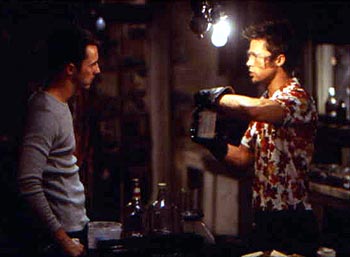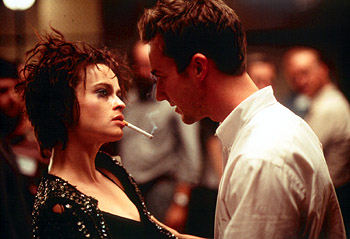Fight Club


David Fincher and Brad Pitt, the same team behind the movie Seven, returns with Fight Club, a visually arresting and emotionally disturbing film from the book by Chuck Palahniuk. Fight Club revolves around the life of Jack (Ed Norton, American History X, Everyone Says I Love You), a normal guy stuck in a dead end job. His life holds no purpose, he cannot experience any true feelings, and to top it off, he cannot sleep. Jack begins attending numerous therapy groups, finding a sort of release in the suffering of others. When he can open up (even though he is lying), he can cry, and then sleep. His newfound sense of normalcy is disrupted by Marla Singer (Helena Bonham Carter, The Theory of Flight, The Wings of the Dove), a woman who, like Jack, attends multiple therapy sessions for afflictions she does not have. Jack discovers that with another 'faker' present, he can no longer relax.
Then, Jack meets Tyler Durden (Pitt, Meet Joe Black, Seven Years in Tibet ), a free spirit trapped in a man's body. Tyler lives for the present, is impulsive, loud, rude, the embodiment of everything that Jack isn't. Jack is attracted to Tyler's spontaneity and his seeming happiness with everything around him. They both soon discover the release felt by pummeling the senses out of each other. Thus the birth of Fight Club. Every Saturday night, these men would gather to fight each other, knocking each other silly. By doing this, they felt they were redeeming themselves as men. As the club gains popularity (despite the wishes of Jack and Tyler), the actions of the club become more nihilistic. Tyler uses Fight Club as a means of expression. By fighting, they are attempting to reach the very essence of their being. They are no longer individuals, everyone exists for the club. Homework assignments are given out; each member must pick a fight with a stranger and lose. Each assignment becomes more dangerous and daring, until Fight Club begins to become responsible for acts of sabotage and vandalism. Somewhere along the way, Jack begins to question Tyler and his motivations.
Topping all of this off is a set of good performances all around. Bonham Carter, usually seen in English period pieces, does not seem out of her element at all. Pitt, who's acting is quite erratic depending on the movie, puts in a surprisingly good performance. Similar to his role in 12 Monkeys, Pitt is over-the-top and free of any inhibitions. Small things like whipping a nunchaku in the background or a simple twitch of his head add a certain depth and credibility to Tyler's unique views of the world. Norton again disappears into his role. He is a versatile actor who picks tough roles and succeeds in each of them. Also surprisingly good is Meat Loaf (Crazy in Alabama, Black Dog) as Robert Paulsen, a survivor of testicular cancer. Jack meets Robert initially in a testicular cancer survival group, but later they meet up again in Fight Club. In the group, Robert was a gentle shoulder to cry on, but Fight Club transforms him mentally into a new man, completely over his devastating loss.
Director Fincher (The Game, Seven) takes the viewer along a strange and wonderful journey through the film. The sets are dark and crumbling, and the visuals evoke a constant sense of eerieness. The house that Tyler and Jack live in is tall and foreboding, sitting in the middle of an industrial area. Each fight pounds Tyler's ideas into your mind more: in order to find yourself, you have to learn how to lose everything. Material possessions mean nothing, they do not signify anything about you. The level of violence is high, but treated with an almost religious reverence. One of Tyler's pastimes is splicing in frames of pornography into family films. Fincher, in a dark comedic twist, splices in frames into different parts of the film (note: the image at the end is not Brad Pitt). The pace of Jim Uhls' script is relentless and Tyler and Jack slowly descend further and further into anarchy, before an interesting plot twist near the end. . The score is by The Dust Brothers, producers extraordinaire (everyone from Hanson to Beck), and thumps a continuous techno-metal beat. Never conventional, Fight Club is an arresting tale of violence, not for the easily squeamish, but well worth the viewing.